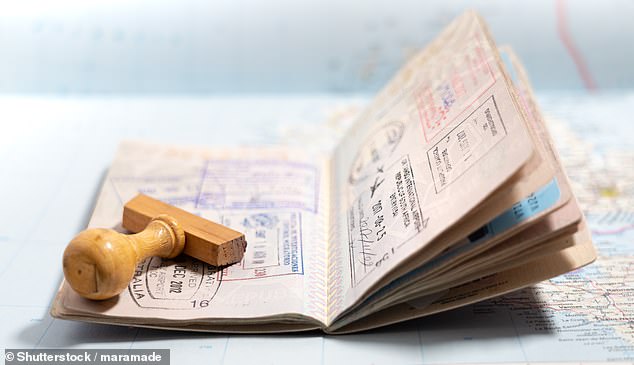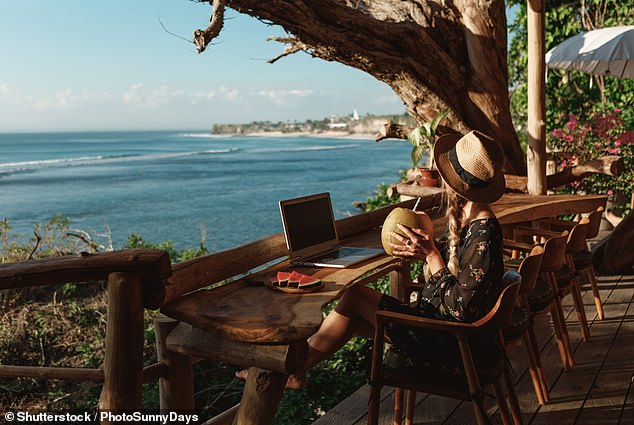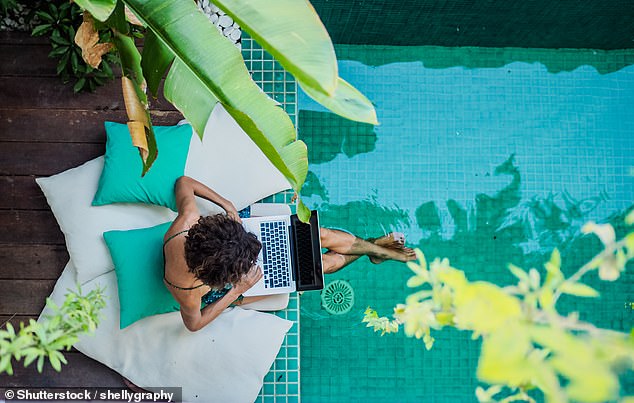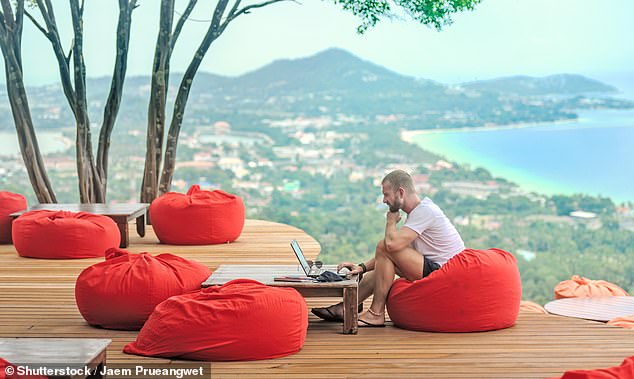How to become a digital nomad – and make a living from the BEACH
4 min readImagine a life where your working day starts with ordering an exotic smoothie to your desk at a beach bar.
Sound appealing? MailOnline Travel has spoken with two digital nomad experts who explain how to make it your reality.
They reveal their top tips, from planning and visa applications to avoiding loneliness.
If you dream of becoming a wanderlust worker, their advice will help you to make the transition.
PLANNING FOR THE TRANSITION

Take at least two to three months to arrange ‘all the logistics of relocating as a digital nomad’, says digital nomad and tech expert Michael Moore, from securing visas to booking long-term accommodation.
Establish a virtual address in your home country that provides mail scanning or forwarding so you have a fixed address for banks, taxes, voting and more.
‘For bank accounts, find options that allow online sign-up and management from anywhere,’ he adds. ‘Digital banks like N26 provide this service.’
Do some shopping, too.
‘Invest in a lightweight, durable laptop powerful enough to handle your workflow plus a backup battery,’ Michael, founder of Devoted to Vinyl, suggests. ‘The lighter the better for frequent travel.’
Having a stable mobile Wi-Fi such as Solis is also key, he says. While cloud platforms like G Suite or Office 365 allow you to access files and tools from any device.
He adds: ‘Download useful apps like Grammarly, Trello and Slack, which let you work efficiently on the go.’
Justin Chia, expert in data analysis, web3 and tech, and founder of Justjooz.com, recommends buying blue-light glasses and noise-cancelling headphones, for better focus and fewer distractions.
VISAS


Research visa requirements thoroughly for each country you intend to visit, ensuring you apply for the one suited to your needs and length of stay, says Michael.
Where you live might be determined by what visas are open to you, with some locations offering ‘digital nomad or freelance visas that provide longer-term options beyond a tourist visa’.
He adds: ‘If you plan to stay put in one spot for an extended period of three months or more, look into securing the appropriate long-term visa. This will allow you to rent an apartment, open a bank account and so on.
‘Be prepared to provide proof of remote work or freelancing such as contracts and client letters when applying for visas. Some require minimum income thresholds. And always have travel medical insurance that covers the duration of your trip or visa period.’
Popular places such as Thailand and Indonesia allow you to visit for 30 days upon arrival, highlights Justin.
He also suggests Germany, Estonia, Croatia and Mexico as countries that offer visas for digital nomads.
ONCE YOU’RE ON THE MOVE…


Once on the move, Michael suggests staying in each destination for at least one to two months.
He says: ‘Anything less than that and you’ll be in a constant state of transit, which can be draining.’
Another factor is tax.
He explains: ‘To avoid tax residency issues, limit yourself to spending no more than six months maximum in any given country per tax year.
‘Consult an accountant knowledgeable about expat taxes and digital nomad implications.
‘You will likely need to continue filing taxes in your home country.
‘Research tax laws in countries where you earn income. You may need to pay taxes in those locations depending on specific rules and thresholds.
‘Look into tax-friendly bases like the UAE, Malaysia or Cayman Islands for setting up a company or becoming a resident.
‘Services like Stripe Atlas allow you to incorporate a U.S business remotely, which can provide tax advantages.’
SETTING UP AND MAINTAINING YOUR NEW WORKING LIFE

‘Start with your existing network and put word out that you are seeking remote work,’ says Michael, who suggests using LinkedIn, social media and alumni job boards.
In addition, he suggests, use specialised remote job boards like RemoteOK, WeWorkRemotely, Remotive, and sign up for job alerts and attend virtual networking events.
He adds: ‘If qualified, register for online teaching platforms such as VIPKid, GoGoKid, Qkids. This provides a steady remote income stream.’
Justin says you should also ensure that your resume shows your remote work skills.
Once you’re up and running, Justin recommends creating a work schedule that ‘works with coworkers back home’, avoiding ‘odd’ working hours and using co-working spaces to ‘help separate your work from your free time’.
WELLBEING AND AVOIDING LONELINESS

Establish a daily morning routine ‘that makes you feel grounded’ – exercise, meditation, journaling – and maintain it even while traveling.
So says Michael, adding: ‘Designate work hours and stick to them. Working all hours can quickly lead to burnout without set leisure time.
‘Co-living spaces provide built-in community. If going solo, stay at social hostels or use apps to find local language exchanges.’
The experts suggest scheduling video calls or staying in touch with friends and family and making new friends on the go.
Justin adds: ‘While the digital nomad life gives great freedom, it can feel lonely too.
‘Deeper connections with people and places bring more joy than constantly moving.’



